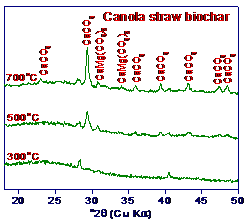Conversion of the agricultural residues by pyrolysis to produce biochar can reduce farm wastes and substitute renewable energy sources for fossil-derived fuels. Biochar has received increasing interest as an approach for nearly permanent locking of atmospheric carbon in soils through a carbon-negative process. Biochar is also beneficial to soils in many ways. It can improve soil physical properties, enhance soil moisture storage, promote development and bioactivity of soil micro-flora, reduce nutrient leaching, recycle soil nutrients, and increase soil organic carbon and thus plant growth. Biochar is commonly alkaline. It can thus be used as a soil amendment to neutralize soil acidity and increase soil pH. However, a mechanistic understanding of the amelioration of the acid soils by biochar has remained limited. Particularly, the forms of the alkalis of biochar need to be probed.
The doctoral candidates Jin-hua Yuan and her supervisor Dr. Ren-kou Xu from the Institute of Soil Science, Chinese Academy of Sciences and Dr. Hong Zhang from Department of Chemistry, Tennessee Technological University used FTIR-PAS (Fourier Transform Infrared Photoacoustic Spectroscopy) spectra, XRD (X-Ray Diffraction) and automatic potentiometric titration methods to study the forms of alkalis of the biochar produced from the straws of canola (Brassica campestris L.), corn (Zea mays L.), soybean (Glycine max L.), and peanut (Arachis hypogaea L.)at different temperatures (300, 500 and 700°C) by means of oxygen-limited pyrolysis. The results showed that the functional groups such as -COO- (-COOH) and -O- (-OH) and the carbonates in the biochar are the main alkaline components of the biochar.Inorganic carbonates are the major alkaline components of the biochar generated at high temperature. Organic anions can contribute to the alkalinity of the biochar, especially for the biochar generated at low temperature.
  |
| FTIR-PAS and XRD pattern of biochar generated from canola straw (The content of carbonates of the biochar increased with increased pyrolysis temperature, the content of functional groups changed oppositely) |
The result has been published on Bioresource Technology (The forms of alkalis in the biochar produced from crop residues at different temperatures. Bioresource Technology 102, 3488-3497. ). The result of the amelioration effect of biochar on the acidic Ultisol has also been published on line in Soil Use and Management (The amelioration effects of low temperature biochar generated from nine crop residues on an acidic Ultisol/Soil Use and Management/doi:10.1111/j.1475- 2743.2010.00317.x).
The results can provide the theoretical basis and technical support for the selection of high efficiency amendments for acid soils and its application in the red soil region in south of China.
